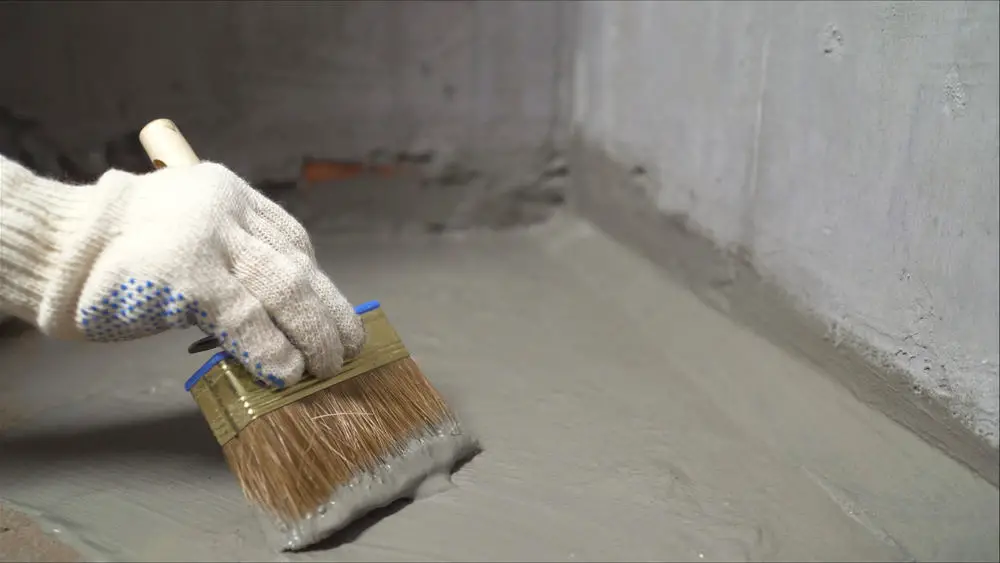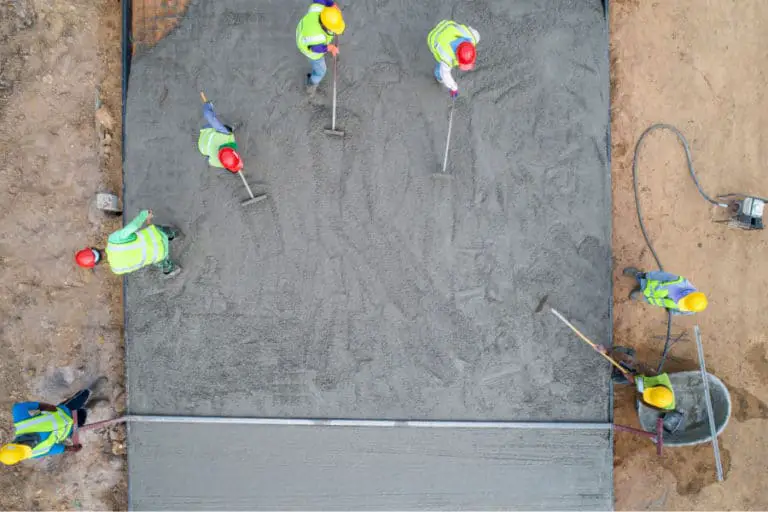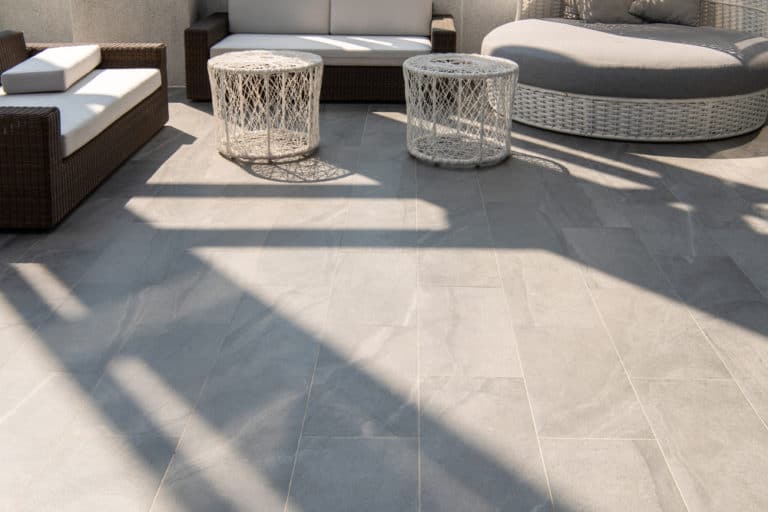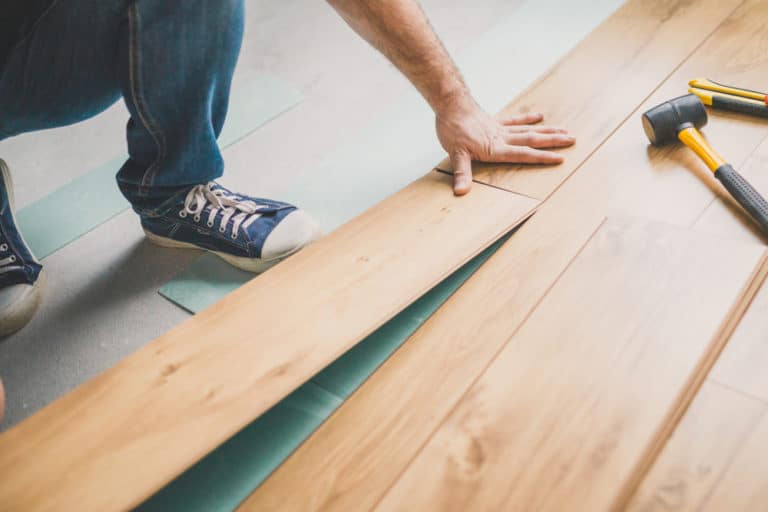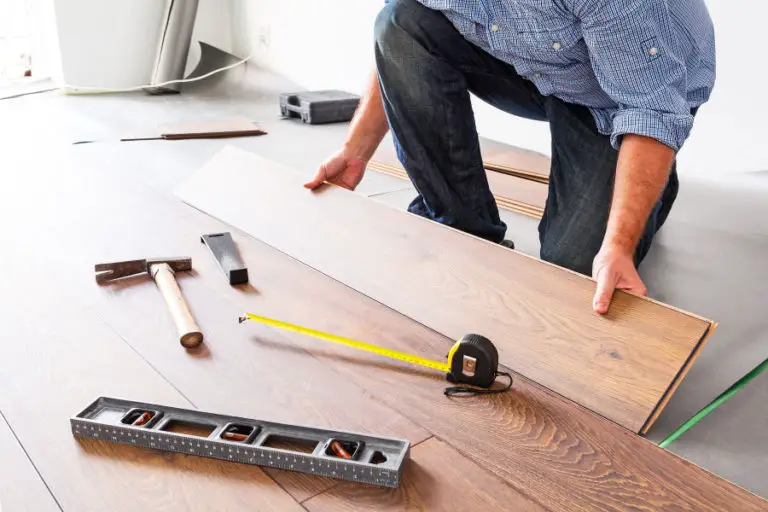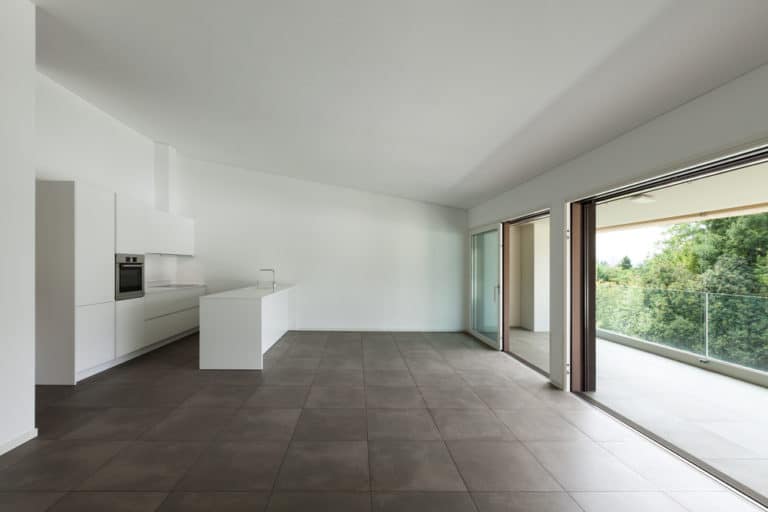What Flooring Is Waterproof For A Basement?
When you start renovating your basement, the best place to start is with the floor. Basements are notorious for harboring moisture. Because concrete is very absorbent, it attracts and soaks up the moisture in the ground surrounding it. I wanted to install basement flooring that would be durable and withstand moisture. So, I wondered what flooring is waterproof for basements?
Waterproof flooring for the basement has to be durable, easy to install, and withstand the moisture cement absorbs. The best waterproof flooring for basements includes laminate flooring, ceramic tiles, vinyl flooring, cork flooring, epoxy flooring, rubber tiles, waterproof paint, and cement sealant.
Choosing a suitable flooring for your basement can be intimidating because it needs to be waterproof, durable, mildew, and mold-proof. It also needs to withstand rot and be easy to maintain. To help me choose the right kind of basement flooring, I asked my friend, a contractor, for advice. We will be discussing what I learned in this post.
What Flooring Is Waterproof For Basement?
Waterproof flooring has gotten more popular in the last few decades. If you want to install the best waterproof flooring in your basement, there are several options to choose from. Here are the best waterproof flooring options we will discuss.
- Ceramic Tiles
- Vinyl/PVC Flooring
- Epoxy Flooring
Ceramic Tiles
The best solution you might have against moisture is to use ceramic tiles. The great thing about installing ceramic tiles in the basement is that you don’t need subflooring. Ceramic tiles work best when installed directly on the cement foundation.
Ceramic tiles are as waterproof as you can get. Remember you need to use waterproof grouting because regular grouting will lift and fall out in wet conditions.
Pros Of Installing Ceramic Tiles
Installing ceramic tiles can be of significant benefit to your home. Some of the pros to installing ceramic tiles in your basement include:
The Price Of Ceramic Tiles
Ceramic tiles are an affordable flooring option for your basement. The price is dependent on the quality of the tiles you choose. If you choose a standard color, it will cost less than those with designs.
You can find lower-grade tiles that may have mismatched colors or patterns and create a unique look for an affordable price. You can expect to pay between $15-20 per sqft if you choose lower grade or plain tiles and $40-$65 per sqft for high-grade tiles.
Maintaining Ceramic Tiles
Ceramic tiles are relatively easy to maintain. The best type of ceramic tile to use in a basement where there is a chance of moisture is glazed ceramic tiles. Glazed tiles have a hard top layer that acts as a waterproof barrier that keeps the tiles from absorbing any spilled liquid like water and drinks.
So, maintaining the tiles merely consists of vacuuming the tiled floor or sweeping the dirt away and cleaning the floor with tile cleaner and a mop once a week.
Durability Of Ceramic Tiles
Ceramic tiles can be very durable and last more than 25 years when installed correctly. However, installation damage might pop up when ceramic tiles have a problem with the subflooring or when you are not using enough tile adhesive or using the wrong grout.
Should it be physical damage to the ceramic tile, for example, something heavy dropped on the floor and cracked a tile, you can easily replace it. You only need a little bit of tile adhesive, a replacement tile, and waterproof grouting.
Design And Color Options
When it comes to design and color options, the list is endless. Ceramic tiles come in various colors and designs and can be customized. These designs include tiles that look like wood, marble, or plain; you can find antique or modern designs as well. You may also find any color you can think of to match your basement’s design.
Cons Of Installing Ceramic Tiles
Ceramic flooring has to be the best flooring option for basements, but there are a few cons to them, including:
The Installation
While installing ceramic tiles is a relatively straightforward process, the installation can be meticulous and time-consuming. The surface of the cement foundation needs to be prepared, and you need to use spacers, so there is room for the grout. None of this is challenging, but it takes more time than some of the other floor options.
Glazed Vs. Unglazed
Glazed ceramic tiles are better for basements with a lot of moisture because unglazed ceramic tiles need to be sealed or absorb stains and water that will damage them over time.
The sealant lasts about 2-3 years; if the basement is a high traffic area and gets mopped at least once a week. So, the sealant will need to be retouched every few years to ensure the tiles stay waterproof.
It Gets Cold In Wintertime
Ceramic tiles can get cold during wintertime, so you might need extra heating in the basement or underfloor heating if you want to use ceramic tiles in your basement. You can also opt for rugs when it’s cold.
Vinyl/PVC Flooring
Vinyl/ PVC flooring is the second-best option to use for basement floors. The reason for this is that vinyl/ PVC flooring is highly water-resistant. Most contractors won’t use the words waterproof as it might give homeowners the idea that PVC/vinyl flooring cannot get damaged by water.
Water can damage vinyl flooring if exposed to water over an extended period. That being said, water will take quite some time to damage the vinyl/PVC flooring.
The issue also comes in if you use adhesives. The adhesives can get damaged by water, and you will need to reapply them eventually. If your basement floor is permanently wet or moist, you need to look for the cause. Most flooring options will suffer if it is permanently exposed to water.
Pros Of Vinyl/PVC Flooring
There are more advantages to using vinyl/ PVC flooring than you might think; here are a few:
Water And Other Resistants
Vinyl/PVC flooring is highly moisture resistant and won’t be affected by water unless you use the kind that requires adhesives. In addition, vinyl/PVC flooring is resistant to mold, mildew, and rot which is a problem with other options like wood or laminate flooring.
It is resistant to the bugs and pests like termites and other wood burrowing bugs that plague wood or laminate floors.
Vinyl/PVC Floors Are Affordable
Vinyl/PVC flooring is among the most affordable flooring options for a basement. You can find stunning designs in almost every color to suit the theme of your basement. The regular vinyl flooring cost between $3-and $6 per sqft, and the high-end or luxury vinyl can cost between $6-and $10 per sqft.
Aesteict Appeal
Vinyl/PVC flooring can come in so many designs, styles, and colors that you can match it to the style of your basement with no problem. Some design options include vinyl flooring that looks like wood, marble, shiplap, and antique.
Cons Of Vinyl/PVC Flooring
There are a few cons to installing vinyl/PVC flooring in your basement, including:
Hard To Remove
Vinyl/PVC flooring is hard to remove. Once the adhesive or glue backing hardens, it becomes difficult to remove. You won’t need special equipment, but it will damage the tile, and you won’t be able to use it again.
Quality Isn’t Always Consistent
Despite having the title of “luxury,” not all vinyl/PVC flooring is quality made. There are discrepancies in thickness, and even a few printing errors can slip through, so it’s crucial to check the consistency of the quality when you are buying the vinyl flooring.
The Dangers Of Old Vinyl
Older vinyl flooring that was made before 1980 can be dangerous. Many building materials contained asbestos because contractors didn’t know about the health risks of using asbestos until 1990. In 1990 using it in building materials was banned in the U.S. If you have old vinyl lying around that you want to give new life, it may be better to throw it out.
Epoxy Flooring
Epoxy is a resin floor material made up of a two-part epoxy system. This system contains polymer resins and hardeners. When the epoxy resins mix and make contact with the cement floor, it bonds the three parts (resin, hardener, and cement) together and forms a thick hard plastic flooring that is very durable.
Pros Of Epoxy Flooring
As one of the quickest and toughest floorings around, there are quite a few advantages to using epoxy flooring in your basement, such as:
It Is Waterproof
If you cover your entire basement floor with epoxy, it becomes waterproof as soon as it hardens. You need to ensure that all the borders are sealed correctly.
It Looks Great
Epoxy comes in various colors, and you can custom make a design you like. Some designs look like marble, and some look like the beach. To get the best out of the color, you can consult an expert and get the best advice. Solid color epoxy floors look great as well, as you can pick from metallic or plain colors to suit your style.
Durability And Resistance
If you maintain the flooring correctly and have it installed by experts, epoxy flooring can last decades. It is among the most durable flooring materials you can find. Epoxy flooring is insect resistant, rot and mold resistant, and won’t easily stain or peel when you clean it.
It is resistant to chemical and oil spills, which is the reason why many automotive repair shops and laboratories use epoxy flooring. After a few years, the shine might dull but can be brought back by a buff and polish.
The Price Point
Epoxy flooring is in the same price range as ceramic tiles but can be less expensive to achieve a high-end look. Some ceramic tiles and wooden flooring materials cost more if you want high-end quality; in those cases, epoxy will be more affordable.
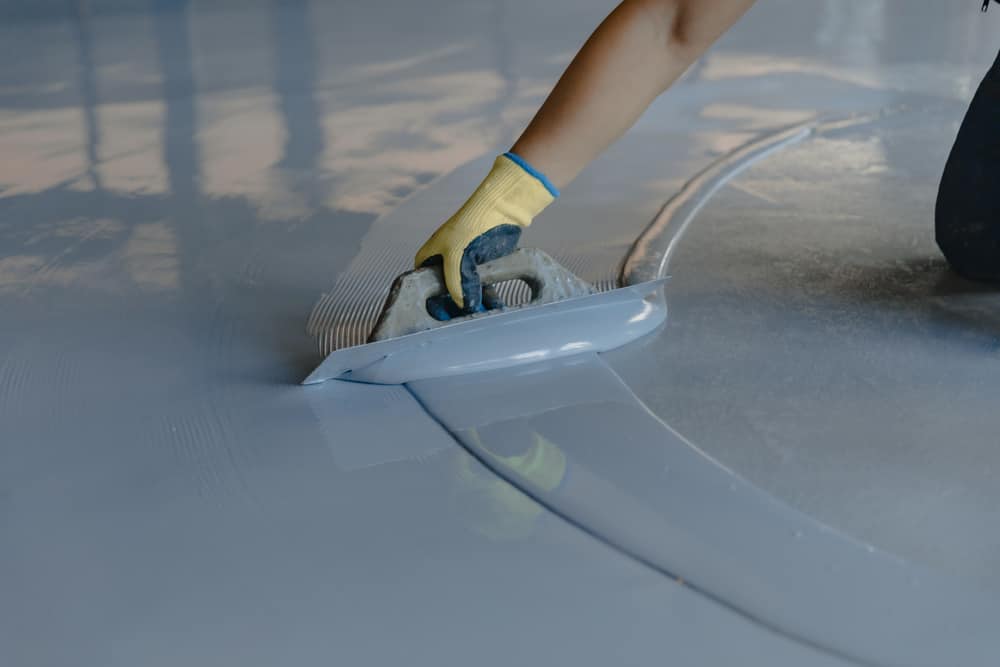
The Cons Of Epoxy Flooring
As with all other flooring materials, epoxy flooring has a few disadvantages to keep in mind:
The Application And Curing Process Is Long
One of the disadvantages of using epoxy flooring is that the process takes a long time to complete. Epoxy takes at least 72 hours to apply and 24 hours to cure completely. It is somewhat inconvenient, but the results are worth it. If you live in a naturally humid and hot climate, the curing process might take longer.
You May Need A Flooring Contractor
Despite how easy the pouring and applying epoxy might look on videos, it takes a person skilled in epoxy to mix the ratios and colors correctly, apply the epoxy correctly and ensure it cures without any bubbles or defects.
In addition, you would do well to have an expert apply the epoxy flooring to your basement as they can create stunning patterns and designs we would have trouble creating.
There Are Fumes
During the application of the epoxy flooring, the contractors wear the appropriate personal protection like dust masks with a respirator, goggles, and gloves to protect them from the harsh fumes of the epoxy. People with asthma need to steer clear from the application site until the epoxy fully cures.
In addition, if there is sanding or maintenance you need to do, you must wear the same protective gear to ensure the powder epoxy doesn’t enter your mouth or eyes.
Slippery Surface
One of the main issues with epoxy flooring is that because it’s a type of plastic when it cures, it is slippery when it’s wet. So you need to remember that because basements are prone to moisture, you must be careful when you are walking on the floor after it’s been washed, there was a storm or a spill of water or a drink.
Conclusion
Choosing a waterproof flooring material for your basement is not an easy task. First, you need to consider the needs of basement floors and your personal preference. The best flooring for basements includes ceramic tiles, epoxy or vinyl, and waterproof paint. You also need to consider the maintenance of these floors.
Basements are prone to moisture, and some flooring materials like laminate and wood panels will need regular maintenance and might end up rotting or attracting insects no matter how hard you try to prevent it. On the other hand, ceramic or vinyl flooring can look like wood, and you can even custom print some of the designs you like on ceramic tiles.

